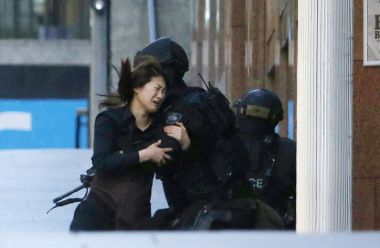Sydney siege aftermath: Why labels like 'good' and 'evil' don't help anyone

In the aftermath of the Sandy Hook shooting in which 20 children and six adults died, the Vice President of the US National Rifle Association called for armed guards to be posted in all schools.
"The only thing that stops a bad guy with a gun is a good guy with a gun," Wayne LaPierre told reporters in Washington DC.
It is entirely understandable to slap labels of 'bad' on these perpetrators who murder and ruin lives. Their intent is to cause chaos, destruction. How can they possibly be anything but evil?
As Australia pays tribute to the victims of the Sydney siege today we find ourselves reflecting on these questions yet again.
But dividing people into 'good guys' and 'bad guys' doesn't help us, however tempting it may be.
Who are the 'bad guys'? How can we identify them before they strike? The problem is that very often the people who we think are the 'good guys' are the ones who think like us, who believe the same things that we do, who dress like us and share the same culture.
In short, the ones like us. And therein lies the problem – we can start to veer towards 'those who are right' (people like me) and 'those who are wrong' (people not like me).
Writing about the Steubenville rape case in the United States, Laurie Penny described what can happen when we start to 'other' individuals or 'types'.
"There's a word for what happens when one group of people sees another as less than human and insists on its right to hurt and humiliate them for fun," Penny observes. "It's an everyday word that is often misused to refer to something outside of ourselves. The word is 'evil'."
Evil is what happens when a group of teenagers stops seeing a woman as a person and treats her like an object, says Penny.
It is what happens when a person stops seeing real, living, breathing individuals and uses them as pawns or a means to the end of their particular cause.
We can also easily 'other' people or groups when we brand a particular faith community responsible for the actions of one of its members.
The #Illridewithyou hashtag on Twitter was an example of many people's refusal to do just that in the wake of the Sydney siege.
Countering fears of a backlash against Muslims, Australians offered support to their Muslim neighbours by offering to commute with them.
At first I wondered whether there was any evidence of people somehow blaming Muslims for what happened. But then I discovered the hashtag #Iwontridewithyou.
And a quick glance at posts referencing the Sydney siege on the Facebook page of Britain First was a depressing read and a classic example of the language of hate and 'them and us'.
Faith groups have a particular responsibility to counter this kind of mentality.
Christians need to be leading the way and we saw a heartening example of this yesterday as religious leaders joined in prayer as the siege unfolded.
Churches, synagogues and mosques across the country opened for prayer services, and a multi-faith vigil was held in Lakemba Mosque in Sydney.
President of the Lebanese Muslim Association, Samier Dandan, told the BBC: "The vigil crossed many different religious groups – Muslims, Catholics, Protestants, Jewish communities... This is a showcase and demonstration that the community can come together in solidarity and work together as a family to try to address whatever issue that we face collectively."
Combating evil and terror involves more than attaching simplistic labels that are theologically inaccurate and socially unhelpful. Fear, and the instinct to blame should not stop us striving for peace.
Sarah Lothian is a freelance journalist. Follow her on Twitter.











